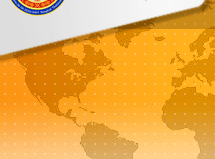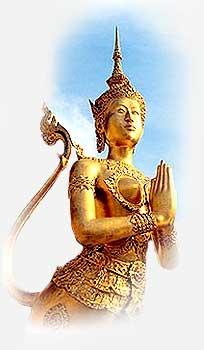Opening Remarks by
His Excellency General Surayud Chulanont (Ret.)
Prime Minister of the Kingdom of Thailand
at the Opening Ceremony of the 4th International Buddhist Conference
on the Occasion of the United Nations Day of Vesak
United Nations Conference Centre, Bangkok, 27 May 2007
----------------------------------
Your Holinesses,
Most Venerable Members of the Sangha,
Most Venerable Rector of Mahachulalongkornrajavidyalaya University,
Mr. Executive Secretary,
Excellencies,
Distinguished Participants,
Ladies and Gentlemen,
I am delighted to be here to address the 4th International Buddhist Conference to mark the United Nations Day of Vesak, the significant day of the Buddhists commemorating the birth, enlightenment and passing away of the Buddha. On behalf of the Thai people, may I first pay my respects and express the warmest welcome to all venerable members of the Sangha and participants from all five continents and 60 countries from around the world.
It is most fitting that we are gathered here at Bangkok’s United Nations Conference Centre, for the Buddha’s message on being aware of oneself, one’s actions and the world in which one lives, and pursuing harmony and peace, is indeed close to that of the United Nations. Inspired by that message, the United Nations General Assembly at its 54th Session in December 1999 passed a resolution recognizing the Day of Vesak to be an important day for the United Nations. Since then, Vesak has been celebrated each year in May at the United Nations Headquarters in New York and at United Nations offices around the world.
It has been an honour for Thailand to host Vesak Day celebrations and the International Buddhist Conference for three successive years. And in 2007, the year in which the Thai people are celebrating the Auspicious Occasion of the 80th Birthday Anniversary of His Majesty the King, it is indeed fortunate for us to have the opportunity to host the event for the fourth time, and to receive the blessings of so many spiritual leaders from all traditions of the Buddhist faith.
I personally believe that the teachings of the Buddha can guide us to a peaceful and just society. For over 2,500 years, the Buddha’s message of peace and the threefold principles of training, namely moral ethics (sila), meditation (samadhi) and clear comprehension of life and its true nature (panya), have offered light to mankind. And the threefold training, as we all know, serves to remove elements that defile human heart, delude his mind and complicate his speech and action. With a peaceful heart, peaceful actions will become a real possibility for individuals and for a peaceful society at large.
Meanwhile, the dhamma helps us achieve a just society. The Five Precepts, which are the basic moral codes, emphasize the respect for life, property and family; responsible speech; and mindful consumption of food and drink. A just society is also one in which there is no divine right for one group over another; all are considered equal in terms of the law of kamma.
We Buddhists already embrace this message. But as we celebrate the United Nations Day of Vesak, we need to examine both the theory and practice of Buddhism. As Buddhism’s power comes from the Buddha’s teachings, we need to see how we can make the Buddha’s message more accessible, more widely known, and have universal application. This is why I very much value this ongoing dialogue and cooperation, and look forward to learning from the collective wisdom of Buddhist leaders and scholars.
Ladies and Gentlemen,
The theme of this Conference is related to the Buddhist contribution to good governance and development. This is a topic of interest not only for Buddhists, but for the whole world. Indeed, I do believe that the dhamma can help us achieve good governance and development in the modern world.
Before this learned audience, let me make some humble observations.
First of all, the concept of governance is not new. It is as old as human civilization. The concept of good governance is not new either, and it is neither Buddhist nor non-Buddhist in character. It is the common interest of everyone and of all civilizations. In the Pali Buddhist scriptures, for example, the concept of chakka-vatti appears as a global righteous ruler who rules through dhamma for the people. We also know that good governance is an ideal which is difficult to achieve in its totality. This, however, does not mean we cannot make efforts towards this ideal. Indeed, it is what many nations, including Thailand, have been doing.
Over the centuries, the teachings of the Buddha, particularly on the law of kamma, have had an enormous influence on the culture and life of the Thai people. In the late 13th and early 14th century, one of our most able rulers, King Ramkhamhaeng the Great, began building what might be regarded as a society based on dhamma. Following the model of the Buddhist Emperor Asoka of India, King Ramkhamhaeng strove to ensure a peaceful and just kingdom. Accordingly, respect for individuals’ rights, concern for the people’s welfare, transparency, people’s participation and efficiency – things that we now consider to be the hallmarks of good governance – were characteristic of governance under King Ramkhamhaeng. It is recorded that the King paid so much attention to people’s livelihoods that everyone was allowed to come and ring a bell if they had a problem, and that the King would respond to the call.
With good governance under King Ramkhamhaeng’s reign, peace and development were realized. People achieved sufficiency characterized by the phrase: “There are fish in the water and there is rice in the fields.” At the same time, they also prospered through commerce.
Thailand has since come a long way. But I put it to you that for us, good governance and the Buddha’s teachings have never been more relevant. Good governance nowadays encompasses corporate governance, local governance, national governance and international governance. It is intimately involved with decision-making and the process through which decisions are implemented. Indeed, it is our aspiration that, at every level of governance, improvements toward the ideal of good governance are made. Only then can we ensure development in every sphere of life for the people, for good governance, peace and development are interlinked.
And it is here that the philosophy of “Sufficiency Economy” bestowed by His Majesty the King finds resonance. For the philosophy not only addresses questions of development, but also governance. Drawing spiritual inspiration from the Buddha’s “Middle Path”, the philosophy provides principles for appropriate conduct based on moderation, reasonableness, self-awareness and knowledge. Not only has Thailand adopted “Sufficiency Economy” as a fundamental principle of national development, but all Thai people are also encouraged to study it and adapt it to their daily lives. But contrary to what some may think, it is not an economic theory. Indeed, it is applicable to all levels and all spheres of activity. Nevertheless, with its emphasis on a just balance, it does involve special concerns for sustainable development through the promotion of self-reliance and appropriate management of resources.
As individuals, communities, businesses and a nation in search of an appropriate development strategy embrace this “Middle Path”, it is a matter of finding the right balance at each level to build a firm foundation to face the challenges of the modern world. Through promoting moral values, the approach also aims to strengthen society’s moral fibre. And through such a holistic approach to human development, one inspired by Buddhist principles, we believe we will attain our goal of a more just, more equitable and more sustainable society.
Indeed, this January the United Nations Development Programme (UNDP) launched the Thailand Human Development Report 2007 which had the theme of “Sufficiency Economy and Human Development”. This initiative pays tribute both to the efforts of His Majesty the King and the spiritual underpinnings of “Sufficiency Economy”. Most importantly, it has served to spread the philosophy’s message, particularly that of good governance and sustainable development, to the wider international audience it deserves.
Ladies and Gentlemen,
It is clear from the foregoing comments that the teachings of the Buddha are in tune with, and have contributed to, the practice of good governance and the promotion of development. As the “Middle Path” continues to inspire us toward new paradigms of sustainable development and building peaceful and just societies, all of us are enjoined to help ensure the ongoing contribution of Buddhism to uplifting the spirit of humanity.
On behalf of the Royal Thai Government, may I once more extend my heartiest welcome and thank all of you for your active contributions to this Conference. I also would like to express my thanks to the International Organizing Committee and the National Organizing Committee for their excellent work in preparing this international Buddhist event. I wish the celebration of the United Nations Day of Vesak 2007 a great success, and hope that your deliberations will serve to further advance the Buddha’s message of compassion for all mankind.
|







